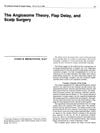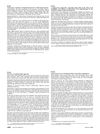 397 citations,
February 2004 in “British Journal of Dermatology”
397 citations,
February 2004 in “British Journal of Dermatology” Minoxidil boosts hair growth by opening potassium channels and increasing cell activity.
 162 citations,
August 2002 in “Survey of Ophthalmology”
162 citations,
August 2002 in “Survey of Ophthalmology” Latanoprost can make eyelashes longer, thicker, and darker.
 32 citations,
January 2018 in “American Journal of Clinical Dermatology”
32 citations,
January 2018 in “American Journal of Clinical Dermatology” Hormone therapy affects hair growth in transgender individuals, with testosterone potentially causing hair loss in trans men and estrogen reducing facial/body hair in trans women; treatment options vary.
 July 1997 in “Journal of Cutaneous Medicine and Surgery”
July 1997 in “Journal of Cutaneous Medicine and Surgery” Finasteride significantly increases scalp hair and prevents hair loss in young and middle-aged men.
 30 citations,
October 2015 in “Journal of Ethnopharmacology”
30 citations,
October 2015 in “Journal of Ethnopharmacology” Herbal compounds like ricinoleic acid, quercetin-3-O-rutinoside, and hinokiflavone may be safe and effective for treating hair loss.

The document concludes that accurate diagnosis and management of PCOS are crucial due to its associated health risks.
 78 citations,
September 2006 in “International Journal of Cosmetic Science”
78 citations,
September 2006 in “International Journal of Cosmetic Science” Dandruff is mainly caused by a scalp reaction to yeast, can worsen hair loss, and antifungal treatments may help.
 36 citations,
May 2011 in “Dermatologic therapy”
36 citations,
May 2011 in “Dermatologic therapy” No treatments fully cure or prevent alopecia areata; some help but have side effects or need more research.
 December 1994 in “The American Journal of Cosmetic Surgery”
December 1994 in “The American Journal of Cosmetic Surgery” Understanding the scalp's blood flow and using delay techniques can improve the success of hair restoration surgeries.
 2 citations,
January 2008 in “Journal of The American Academy of Dermatology”
2 citations,
January 2008 in “Journal of The American Academy of Dermatology” Trichoscopy is a helpful and quick method to diagnose hair loss without shaving.
 2 citations,
May 2001 in “Current problems in dermatology”
2 citations,
May 2001 in “Current problems in dermatology” The conclusion is that effectively treating hair disorders is difficult due to the complex factors affecting hair growth and more research is needed to improve treatments.
 11 citations,
July 2017 in “Expert Opinion on Investigational Drugs”
11 citations,
July 2017 in “Expert Opinion on Investigational Drugs” New hair loss treatments may include topical medications, injections, and improved transplant methods.
3 citations,
July 2023 in “International journal of molecular sciences” Stress may contribute to hair loss in alopecia areata by affecting immune responses and cell death in hair follicles.
 15 citations,
July 1991 in “International Journal of Dermatology”
15 citations,
July 1991 in “International Journal of Dermatology” Laser Doppler velocimetry is a valuable noninvasive tool for skin blood flow research in dermatology.
 10 citations,
July 2011 in “British Journal of Dermatology”
10 citations,
July 2011 in “British Journal of Dermatology” Lower growth factors linked to balding in androgenetic alopecia.
 150 citations,
October 2010 in “The American Journal of Pathology”
150 citations,
October 2010 in “The American Journal of Pathology” The document concludes that more research is needed to better understand and treat primary cicatricial alopecias, and suggests a possible reclassification based on molecular pathways.
 20 citations,
January 2015 in “Current problems in dermatology”
20 citations,
January 2015 in “Current problems in dermatology” Graying hair happens due to aging and might be delayed by new treatments.
 9 citations,
September 2018 in “Journal of Photochemistry and Photobiology B-biology”
9 citations,
September 2018 in “Journal of Photochemistry and Photobiology B-biology” A hair-growth formula with cystine and thiamin helps protect skin cells against UV damage and improves their growth.
 44 citations,
November 2009 in “Archives of Dermatology”
44 citations,
November 2009 in “Archives of Dermatology” CYLD mutations cause a variety of skin tumors with symptoms starting around age 16, and treatments are currently limited.
 157 citations,
April 1994 in “Clinical endocrinology”
157 citations,
April 1994 in “Clinical endocrinology” Androgens can cause hair growth in some areas and hair loss on the scalp.
 1113 citations,
August 1999 in “The New England Journal of Medicine”
1113 citations,
August 1999 in “The New England Journal of Medicine” Hair follicle biology advancements may lead to better hair growth disorder treatments.
 6 citations,
April 2017 in “Frontiers in Pharmacology”
6 citations,
April 2017 in “Frontiers in Pharmacology” Chinese medicine may help treat hair loss by affecting genes and enzyme activity.
 30 citations,
January 2008 in “The Aging Male”
30 citations,
January 2008 in “The Aging Male” The study found no link between baldness patterns and androgen levels in men with benign prostate enlargement or prostate cancer.
 10 citations,
January 2019 in “Biomarker Insights”
10 citations,
January 2019 in “Biomarker Insights” Scalp cooling to prevent hair loss from chemotherapy works for some but not all, and studying hair damage markers could improve prevention and treatment.
 233 citations,
November 2002 in “The journal of investigative dermatology/Journal of investigative dermatology”
233 citations,
November 2002 in “The journal of investigative dermatology/Journal of investigative dermatology” Creating stronger blockers for skin enzymes might lead to better treatment for conditions like acne and excessive hair growth.

Male pattern baldness is a common hair loss in men caused by genetics and hormones, with treatments including drugs, hair transplants, and hair loss products.
 19 citations,
September 2019 in “EMBO molecular medicine”
19 citations,
September 2019 in “EMBO molecular medicine” Blocking TSLP reduces skin inflammation and cell overgrowth in psoriasis.

Men with androgenetic alopecia may have a higher risk of metabolic syndrome.
 16 citations,
June 2008 in “Springer eBooks”
16 citations,
June 2008 in “Springer eBooks” Over 50% of women over 50 experience hair loss, with minoxidil being the only proven effective treatment.
 1 citations,
March 2024 in “Skin research and technology”
1 citations,
March 2024 in “Skin research and technology” A new AI model diagnoses hair and scalp disorders with 92% accuracy, better than previous models.





























